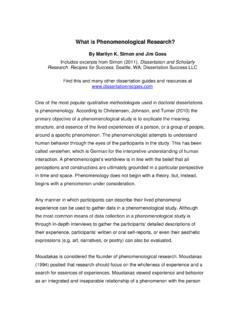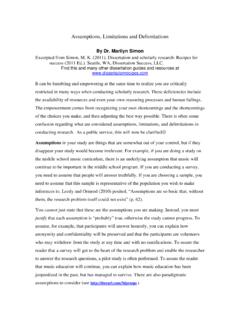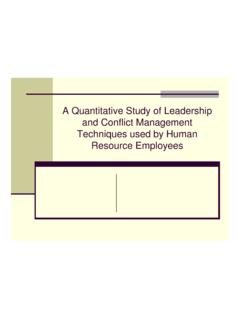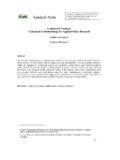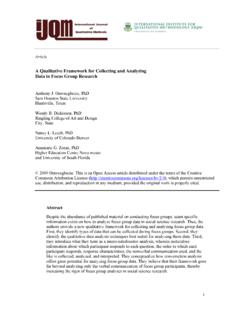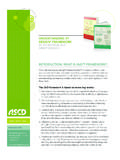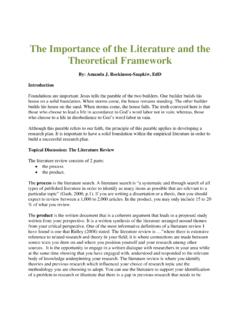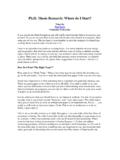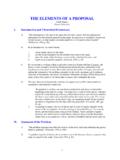Transcription of Developing a Theoretical Framework
1 Developing a Theoretical Framework By Marilyn K. Simon and Jim Goes Includes excerpts from Simon (2011), Dissertation and Scholarly research : Recipes for Success. Seattle, WA: Dissertation Success LLC Find this and many other dissertation guides and resources at Developing a Theoretical Framework that guides the logic of what you are doing in a dissertation or thesis can be challenging. Trochim (2006) contends there are two domains in research theory and observation. Trochim refers to theory as what is going on inside the head of the researcher, while observation is what goes on in the real world where data are collected. A good theory or set of theories can guide every aspect of your study from formulation of the research questions and problem statement, through discussing the findings of your data analyses and writing the conclusions.
2 The Theoretical Framework provides a well-supported rationale to conduct your study, and helps the reader understand your perspective. A good Theoretical Framework assures the reader that the type of investigation you propose is not based solely on your personal instincts or guesses, but rather informed by established theory and empirical facts obtained from credible studies. Whatever problem you are investigating, or research questions you are seeking answers to, there are important underlying assumptions related to your study. Those assumptions are based in theory and logic however subtle or implicit they may seem at times. Your job is to explicitly state the theory or theories and attach this to most components of your study. Once you have selected a theory or theories that you feel reflect(s) your understanding and the direction of your study, consult your thesis adviser, research professor, or favorite instructor about your choice of theory, and convince him or her why this will work well in your proposed study.
3 Cutting Board Here are some questions that can help you articulate the theory behind your inquiry: 1. Examine your title, thesis, topic, research problem, or research questions. In one sentence, what is the concern you are investigating? Example: Minority students in urban high schools are not doing well on standardized tests in mathematics. _____ 2. Brainstorm on what you consider to be the key variables in your research . Example: Mathphobia, high stakes testing, high school students, unprepared teachers, racism, poor funding, teaching techniques, socio-economic conditions _____ 3. Read and review related current literature on this topic. Conduct a key word search to locate articles related to your topic. 4. Identify germinal and key authors who have advanced this area of inquiry: Example: Coleman, Freire, Kohn, Oakes, Thomas, Rothstein, Jacobsen, Tobias, Wigfield, _____ 5.
4 List the constructs and variables that might be relevant to your study. In a quantitative study list the possible DVs and IVs Example: Dependent variables: Mathematics Anxiety, Self-efficacy, Socio-economic class, ethnicity, race, teaching philosophies, teaching techniques Independent Variable: Performance on high stakes mathematics tests. _____ 6. Consider how these variables directly relate to the theory. Does the theory or theories provide guidance for how these variables might behave? Explain the connection between the theory and the variables. _____ 7. Revise your search and add the word theory to your key words to find the theories and theorist most in line with your thinking. Example: Critical Race Theory, Constructivism, Social Cognitive Theory _____ 8.
5 Discuss the assumptions or propositions of each theory and point out its relevance to your research . Example: Constructivism holds that learning always builds upon knowledge that a student already knows and can build prior knowledge and experience known as schema. Because all learning is filtered through pre-existing schemata, constructivists suggest that learning is more effective when a student is actively engaged in learning mathematics rather than attempting to receive knowledge passively. A wide variety of methods claim to be based on constructivist learning theory. Most of these methods rely on some form of guided discovery where the teacher limits direct instruction and attempts to lead the student through questions and activities to discover, discuss, appreciate, and verbalize the new knowledge.
6 Critical Race Theory: CRT theorists question the social and cultural assumptions of whiteness and blackness inequalities. Building awareness across cultural groups is difficult when dealing with racial differences, and might explain why some ethnic groups perform differently in mathematics or other academic fields. According to Bandura's Social Cognitive Theory, self-efficacy has an important role in students' achievement. The proposed study could investigate the role of personal variables on students' math achievement. These could include, but not be limited to: math self-efficacy, mathematics anxiety, math attitudes and prior math achievement. _____ As you develop your Theoretical Framework consider alternative theories that might challenge your perspective.
7 Also consider the limitations associated with your theory, and quite possibly, that your problem could be better understood by other Theoretical frameworks.
